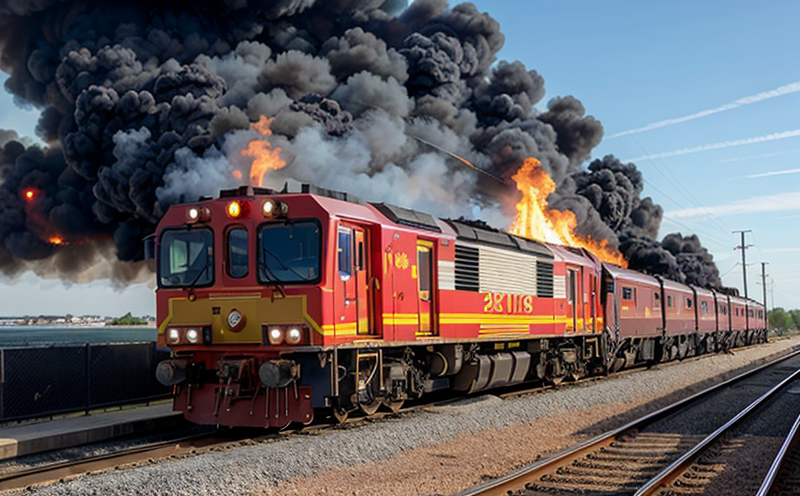Certification Testing for Railway Fire Safety Compliance
The railway industry is a critical component of modern transportation infrastructure. Ensuring the fire safety compliance of materials and systems used in rail operations is paramount to safeguarding passengers, staff, and the environment against potential fire hazards. The Fire Safety Testing division at Eurolab specializes in providing comprehensive certification testing services tailored for railway applications.
The primary objective of our service is to help clients achieve compliance with relevant international standards such as ISO 8613, EN 45545-2, and ASTM E672. These standards are designed to ensure that materials used in the construction of railway carriages meet stringent fire safety requirements.
Our testing services encompass a wide range of materials including but not limited to plastics, composites, textiles, metals, and adhesives. We conduct rigorous tests on these materials under simulated conditions that mimic real-world railway environments. This includes exposure to high temperatures, flame impingement, and other challenging scenarios.
Specimen preparation is a crucial step in our testing process. It involves cutting samples according to predefined dimensions specified by the relevant standards. Once prepared, specimens undergo various tests such as heat release rate measurement, smoke density analysis, and char depth determination using sophisticated instrumentation like calorimeters and spectrophotometers.
The data collected from these tests is meticulously analyzed and compared against established acceptance criteria. Any deviations from standard thresholds are documented comprehensively to guide necessary corrective actions or material modifications.
Upon successful completion of all required tests, Eurolab issues detailed reports providing full documentation of the testing process along with results interpretation. These reports serve as valuable tools for quality managers, compliance officers, R&D engineers, and procurement teams responsible for ensuring adherence to regulatory requirements.
In addition to our core certification testing services, we also offer consultancy support aimed at helping clients understand current trends and best practices in railway fire safety. Our team of experts can provide guidance on selecting appropriate materials based on specific project needs while ensuring long-term cost-effectiveness.
Our commitment to excellence ensures that every test conducted adheres strictly to industry standards. By partnering with Eurolab, you gain access to state-of-the-art facilities equipped with cutting-edge equipment capable of simulating diverse railway environments accurately. Our experienced technicians and engineers ensure accurate data collection throughout all stages of testing.
Through our expertise in railway fire safety certification testing, we contribute significantly towards enhancing public safety while supporting sustainable development initiatives within the rail sector. Partnering with us means gaining a reliable partner who understands your unique challenges and works closely to achieve successful outcomes.
Industry Applications
The application of our railway fire safety certification testing services extends across multiple areas within the broader transportation industry. Here are some key sectors where these tests play an essential role:
- Railway Carriages: Ensuring that interior and exterior materials used in passenger carriages meet strict fire safety standards.
- Trackside Structures: Testing components such as signaling systems, overhead wires, and other infrastructure elements exposed to external environments.
- Emergency Equipment: Evaluating the performance of firefighting equipment including extinguishers, hydrants, and hoses under simulated operational conditions.
By focusing on these critical areas, our services help maintain a high level of safety across all aspects of railway operations. This contributes not only to passenger protection but also enhances overall system reliability and resilience.
Eurolab Advantages
Partnering with Eurolab for your railway fire safety certification testing needs offers numerous advantages that set us apart from other laboratories:
- Expertise and Experience: Our team comprises highly skilled professionals with extensive knowledge in materials science, thermal analysis, and compliance engineering.
- State-of-the-Art Facilities: Equipped with advanced testing equipment capable of simulating real-world railway scenarios accurately.
- Comprehensive Reporting: Detailed reports providing comprehensive insights into test results along with recommendations for improvement or modifications.
- Rapid Turnaround Times: Efficient workflows ensure minimal delays in obtaining certification documentation.
We pride ourselves on delivering reliable, accurate, and timely testing services that meet the highest industry standards. Our unwavering commitment to quality ensures that every test conducted adheres strictly to international norms like ISO 8613, EN 45545-2, and ASTM E672.
Environmental and Sustainability Contributions
Beyond ensuring compliance with regulatory requirements, our railway fire safety certification testing also plays a vital role in promoting sustainability within the rail sector. By selecting materials that meet stringent fire safety standards while minimizing environmental impact, we contribute positively to the overall green credentials of the industry.
Through careful selection and evaluation of sustainable materials during the certification process, Eurolab helps minimize waste generation throughout the lifecycle of railway projects. Additionally, our testing services support the development of eco-friendly solutions that enhance energy efficiency and reduce carbon footprints associated with rail operations.
Incorporating these practices into daily operations not only promotes responsible resource use but also fosters innovation in green technologies within the sector. By working closely with clients during early stages of product design, we facilitate informed decision-making processes that prioritize both safety and environmental stewardship simultaneously.





